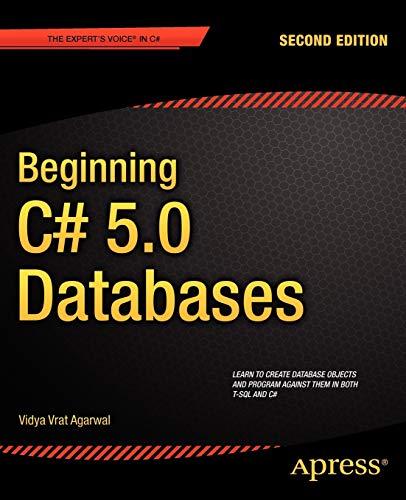Question
The students only need to implement the following three functions: int binary_to_decimal(string b); // precondition: b is a string that consists of only 0s and
The students only need to implement the following three functions:
int binary_to_decimal(string b);
// precondition: b is a string that consists of only 0s and 1s
// postcondition: the positive decimal integer that is represented by b
string decimal_to_binary(int n);
// precondition: n is a positive integer
// postcondition: ns binary representation is returned as a string of 0s and 1s
string add_binaries(string b1, string b2);
// precondition: b1 and b2 are strings that consists of 0s and 1s, i.e. b1 and b2 are binary
// representations of two positive integers
// postcondition: the sum of b1 and b2 is returned. For instance, if b1 = 11, b2 = 01, // then the return value is 100
#include
#include
#include
using namespace std;
int binary_to_decimal(string s);
// precondition: s is a string that consists of only 0s and 1s
// postcondition: the positive decimal integer that is represented by s
string decimal_to_binary(int n);
// precondition: n is a positive integer
// postcondition: ns binary representation is returned as a string of 0s and 1s
string add_binaries(string b1, string b2);
// precondition: b1 and b2 are strings that consists of 0s and 1s, i.e.
// b1 and b2 are binary representations of two positive integers
// postcondition: the sum of b1 and b2 is returned. For instance,
// if b1 = 11, b2 = 01, then the return value is 100
void menu();
// display the menu. Student shall not modify this function
int grade();
// returns an integer that represents the students grade of this projects.
// Student shall NOT modify
bool is_binary(string b);
// returns true if the given string s consists of only 0s and 1s; false otherwise
bool test_binary_to_decimal();
// returns true if the students implementation of binary_to_decimal function
// is correct; false otherwise. Student shall not modify this function
bool test_decimal_to_binary();
// returns true if the students implementation of decimal_to_binary function is correct; false otherwise. Student shall not modify this function
bool test_add_binaries();
// which returns true if the students implementation of add_binaries function
// is correct; false otherwise. Student shall not modify this function
int main()
{
int choice;
string b1, b2;
int x, score;
do{
// display menu
menu();
cout << "Enter you choice: ";
cin >> choice;
// based on choice to perform tasks
switch(choice){
case 1:
cout << "Enter a binary string: ";
cin >> b1;
if(!is_binary(b1))
cout << "It is not a binary number ";
else
cout << "Its decimal value is: " << binary_to_decimal(b1) << endl;
break;
case 2:
cout << "Enter a positive integer: ";
cin >> x;
if(x <= 0)
cout << "It is not a positive integer" << endl;
else
cout << "Its binary representation is: " < break; case 3: cout << "Enter two binary numbers, separated by white space: "; cin >> b1 >> b2; if(!is_binary(b1) || !is_binary(b2)) cout << "At least one number is not a binary" << endl; else cout << "The sum is: " << add_binaries(b1, b2) << endl; break; case 4: score = grade(); cout << "If you turn in your project on blackboard now, you will get " << score << " out of 10" << endl; cout << "Your instructor will decide if one-two more points will be added or not based on your program style, such as good commnets (1 points) and good efficiency (1 point)" << endl; break; case 5: cout << "Thanks for using binary calculator program. Good-bye" << endl; break; default: cout << "Wrong choice. Please choose 1-5 from menu" << endl; break; } }while(choice != 5); return 0; } int binary_to_decimal(string s){ // you implement this return 0; } string decimal_to_binary(int n){ // you implement this return "0"; } string add_binaries(string b1, string b2){ // you implement this return "0"; } void menu() { cout << "****************************** "; cout << "* Menu * "; cout << "* 1. Binary to Decimal * "; cout << "* 2. Decinal to Binary * "; cout << "* 3. Add two Binaries * "; cout << "* 4. Grade * "; cout << "* 5. Quit * "; cout << "****************************** "; } int grade(){ int result = 0; // binary_to_decimal function worth 3 points if(test_binary_to_decimal()){ cout << "binary_to_decimal function pass the test" << endl; result += 3; } else cout << "binary_to_decimal function failed" << endl; // decinal_to_binary function worth 2 points if(test_decimal_to_binary()){ cout << "decimal_to_binary function pass the test" << endl; result += 2; } else cout << "decimal_to_binary function failed" << endl; // add_binaries function worth 3 points if(test_add_binaries()){ cout << "add_binaries function pass the test" << endl; result += 3; } else cout << "add_binaries function pass failed" << endl; return result; } bool is_binary(string s){ for(int i = 0; i < s.length(); i++) if(s[i] != '0' && s[i] != '1') // one element in s is not '0' or '1' return false; // then it is not a binary nunber representation return true; } bool test_binary_to_decimal(){ if(binary_to_decimal("0") != 0 || binary_to_decimal("1") != 1) return false; if(binary_to_decimal("010") != 2 || binary_to_decimal("10") != 2) return false; if(binary_to_decimal("01101") != 13 || binary_to_decimal("1101") != 13) return false; return true; } bool test_decimal_to_binary(){ if(decimal_to_binary(0) != "0" || decimal_to_binary(1) != "1") return false; if(decimal_to_binary(2) != "10" || decimal_to_binary(13) != "1101") return false; return true; } bool test_add_binaries(){ if(add_binaries("0", "0") != "0") return false; if(add_binaries("0", "110101") != "110101") return false; if(add_binaries("1", "110111") != "111000") return false; if(add_binaries("101", "111011") != "1000000") return false; return true; }
Step by Step Solution
There are 3 Steps involved in it
Step: 1

Get Instant Access to Expert-Tailored Solutions
See step-by-step solutions with expert insights and AI powered tools for academic success
Step: 2

Step: 3

Ace Your Homework with AI
Get the answers you need in no time with our AI-driven, step-by-step assistance
Get Started


